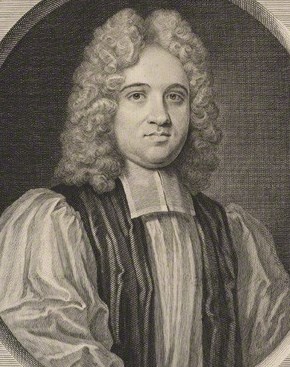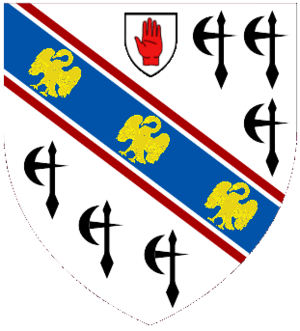Sir William Dawes, 3rd Baronet facts for kids
Quick facts for kids The Most Reverend and Right Honourable Sir William Dawes Bt |
|
|---|---|
| Archbishop of York | |
 |
|
| Province | York |
| Diocese | York |
| In Office | 1714–1724 |
| Predecessor | John Sharp |
| Successor | Lancelot Blackburne |
| Other posts | Dean of Bocking (1698–1708) Bishop of Chester (1708–1714) |
| Orders | |
| Consecration | 1708 |
| Personal details | |
| Born | 12 September 1671 Lyons, Essex, England |
| Died | 30 April 1724 (aged 52) Westminster, Middlesex, Great Britain |
| Buried | Chapel, St Catharine's Hall, Cambridge |
| Nationality | English (later British) |
| Denomination | Anglican |
| Parents | Sir John Dawes Christian née Lyons |
| Spouse |
Frances D'Arcy
(m. 1692; died 1705) |
| Children | 5 sons & 2 daughters |
| Alma mater | St John's College, Oxford St Catharine's Hall, Cambridge |
Sir William Dawes (born September 12, 1671 – died April 30, 1724) was an important leader in the Anglican Church. He was a Baronet, which is a special title of honor. Sir William served as the Bishop of Chester from 1708 to 1714. After that, he became the Archbishop of York, a very high position, from 1714 until he passed away in 1724. He was also known for his political views, as he supported the Hanoverian royal family.
Contents
Early Life and Education
Sir William Dawes was born in a place called Lyons, near Braintree in Essex, England. When he was nine years old, he started attending Merchant Taylors' School in London. He was a very bright student.
A Young Scholar
By the age of 15, William was already very good at Hebrew, an ancient language. When he was just 18, he wrote a poem called The Anatomy of Atheisme. He also wrote an important book in prose called The Duties of the Closet. These writings showed how smart and dedicated he was even at a young age.
University Studies
In 1687, William went to St John's College, Oxford University. He later moved to St Catharine's College, Cambridge in 1689. He earned his Master of Arts (MA) degree from St Catharine's in 1695. He received this degree early because of a special royal order. In 1696, he earned his Doctor of Divinity (DD) degree, which is a high degree in theology.
Becoming a Church Leader
Sir William Dawes had a successful career in the Church of England. He held several important positions.
Serving the Royal Family
William Dawes became a pastor for King William III. Later, he served as a court pastor for Queen Anne. This meant he was a religious advisor and leader for the royal family.
Roles at Cambridge University
From 1697 to 1714, he was the Master of St Catharine's Hall, Cambridge. This was a leadership role at the college. He also served as the Vice-Chancellor of Cambridge University from 1698 to 1699. This role meant he helped manage the whole university.
Dean of Bocking
In 1698, he was chosen to be the rector in the village of Bocking, Essex. In Bocking, the rector is called the Dean. He started a new tradition there. Instead of only having Holy Communion three times a year, he made it a monthly event. This was a big change for the time.
Bishop and Archbishop
On February 8, 1708, Queen Anne personally chose him to become the Bishop of Chester. This was a special appointment, as the Queen went against her ministers' advice to choose him.
In 1714, he became the Archbishop of York. This was a very important position, and he held it until he died in 1724. He was also a Privy Counsellor. This meant he was a trusted advisor to the King or Queen. His predecessor, John Sharp, greatly respected him and asked the Queen to appoint Dawes as his successor. The Queen was happy to agree. Sir William also helped restore the Archbishop's palace in York, called Bishopthorpe.
Sir William Dawes was known as a great preacher during his time. He was seen as a strong and respected leader. He passed away on April 30, 1724, and was buried in the chapel of St Catharine's College with his wife.
Family Life
Sir William Dawes was the son of Sir John Dawes and Christian Lyons.
He married Frances Cole d'Arcy on December 1, 1692. They had five sons and two daughters together. Their daughter Elizabeth later married Sir William Milner.
Images for kids
| Baronetage of England | ||
|---|---|---|
| Preceded by Robert Dawes |
Baronet (of Putney) 1690–1724 |
Succeeded by Darcy Dawes |
| Academic offices | ||
| Preceded by John Eachard |
Master of St Catharine's College, Cambridge 1697–1714 |
Succeeded by Thomas Sherlock |
| Church of England titles | ||
| Preceded by Nicholas Stratford |
Bishop of Chester 1708–1714 |
Succeeded by Francis Gastrell |
| Preceded by John Sharp |
Archbishop of York 1714–1724 |
Succeeded by Lancelot Blackburne |
 | Anna J. Cooper |
 | Mary McLeod Bethune |
 | Lillie Mae Bradford |



